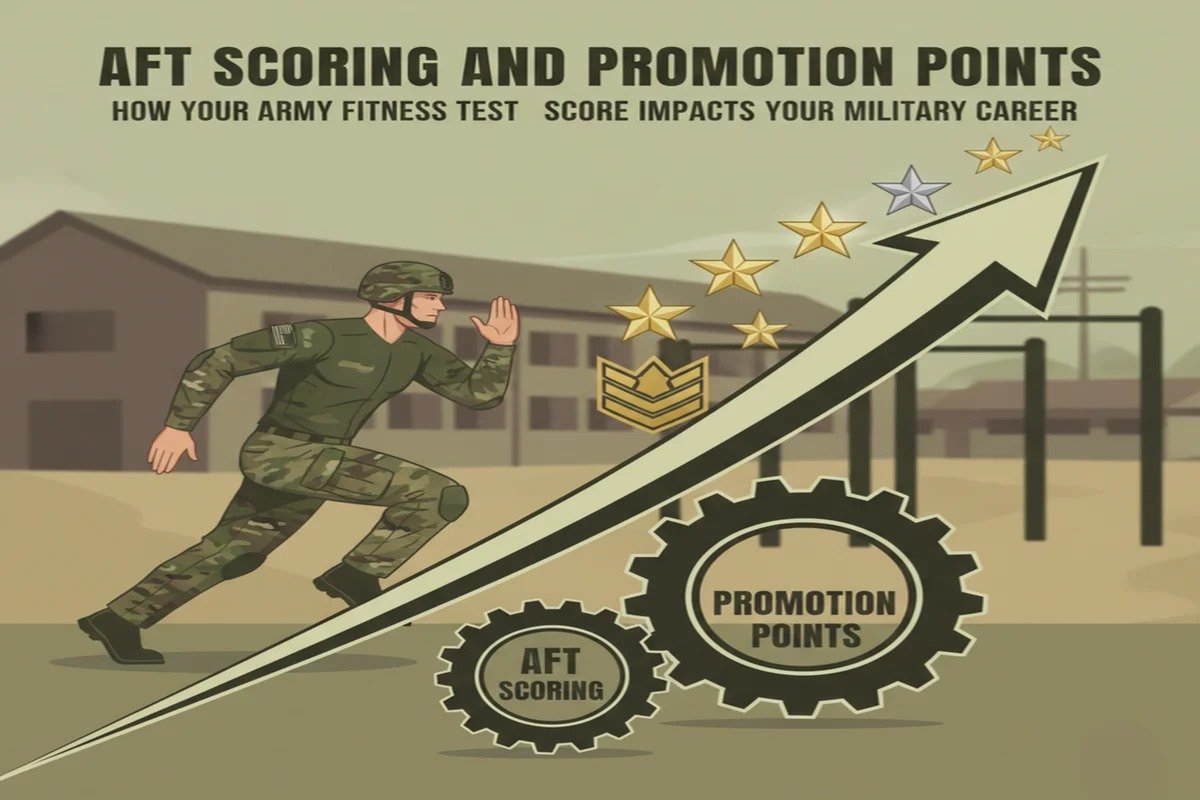AFT Scoring and Promotion Points: How Your Army Fitness Test Score Impacts Your Military Career
Physical readiness is one of the most important requirements in the U.S. Army. It not only ensures combat effectiveness but also plays a direct role in a soldier’s career progression. The Army Fitness Test (AFT) — officially the Army Combat Fitness Test (ACFT) — determines your physical readiness and contributes to your scoring and promotion points, especially for enlisted soldiers seeking to move up in rank.
Understanding how AFT connects to scoring and promotion points allows soldiers to plan better, improve performance strategically, and compete for advancement more successfully.
What Is AFT Scoring and Promotion Points?
AFT scoring is based on six separate events that measure strength, agility, muscular endurance, and cardiovascular ability. Each event is scored between 0 and 100 points, with a maximum possible score of 600.
The six official events include the following:
- Deadlift
- Standing Power Throw
- Hand Release Push-ups
- Sprint-Drag-Carry
- Plank (core replacement for sit-ups)
- Two-Mile Run
Every soldier must achieve a minimum of 60 points per event to pass the test. This ensures balanced overall fitness, rather than relying on a single strength area. Soldiers aiming for promotion usually need scores significantly above the minimum, because higher ACFT scores reflect better readiness and offer career benefits.
AFT Grading Scale: Quality of Performance
AFT results are classified into grades to measure overall performance quality. Although internal scoring is numerical, grades help determine where a soldier stands physically.
| Score Range | Grade | Status |
| 540–600 | A | Outstanding |
| 480–539 | B | Excellent |
| 360–479 | C | Satisfactory (minimum Army standard) |
| Below 360 | F | Fail |
A soldier with an A or B grade not only passes strongly but is more competitive for new assignments, courses, and promotions.
Why AFT Scoring Matters for Promotion Points
Soldiers competing for advancement into ranks such as Sergeant (E-5) and Staff Sergeant (E-6) require a strong combination of administrative points, education, awards, experience, and physical fitness readiness.
The AFT score influences promotion boards in two main ways:
- It determines Physical Fitness points, which are included in total promotion point calculations.
- Strong fitness scores significantly improve military leadership recommendations, confidence levels, and competitive ranking.
Although the AFT is not converted directly into scoring and promotion points like older fitness tests once were, its results play a major role in soldier evaluations.
Promotions are never based on a single metric. However, a lower fitness score can keep a soldier from advancing even when they excel elsewhere. That’s why maintaining a high AFT score is essential for career stability and progression.
How AFT Scoring Connects to Evaluation Reports
Every soldier receives a performance evaluation known as:
- NCOER (Non-Commissioned Officer Evaluation Report) for NCOs
- OER (Officer Evaluation Report) for officers
These performance reports include physical readiness assessments. Soldiers who consistently score high on the AFT are viewed as more capable leaders who are physically ready for operational missions and deployments. Strong scores improve:
- Leadership rankings
- Competitiveness for selective schools
- Opportunities for special operational units
- Chances to earn high-level recommendation marks
Promotion Point Categories Where Fitness Matters
Promotion points depend on rank and advancement category. The U.S. Army defines several categories that total up to the maximum allowable points. Fitness performance contributes to several sections at the board’s review.
Where AFT scoring influences promotions:
Physical Readiness Standards
Failing to meet the minimum fitness standards removes a soldier from promotion eligibility completely. In contrast, strong scores confirm readiness to lead and advance.
Demonstrated Motivation and Performance
Positive fitness results reflect dedication and discipline — traits expected in leaders. Board members consistently reward excellence when reviewing candidates.
Military School Opportunities
Some schools require higher physical scores. Completing these courses can help soldiers earn additional promotion points. A strong AFT score is the gateway to these opportunities.
Retention and Career Strength
Physical performance contributes to career longevity. Soldiers with persistent failures may experience delayed promotions or risk separation from service.
The Army expects soldiers who hold higher ranks to serve as the physical standard for others. Therefore, performance quality matters greatly.
Pass vs. Compete: A Soldier’s Mindset Toward Fitness
Passing the Army Fitness Test is only the beginning. Soldiers who aim to succeed must think beyond the minimum requirements.
When considering promotion competition, there are two types of performance:
- Pass Standards: Meeting the minimum score in every event
- Competitive Standards: Exceeding average levels to demonstrate superior ability
The Army is a performance-based institution, meaning those who train harder and score higher stand out and get ahead.A soldier who regularly scores 450–500+ points naturally shows greater physical ability, motivation, and discipline, making them a stronger promotion candidate.
AFT Score Improvement and Long-Term Promotion Benefits
Extra effort in physical fitness provides lasting advantages. Soldiers with high AFT scores typically experience faster career progression and are selected more frequently for:
- Important leadership positions
- In-demand duty assignments
- Special qualification opportunities
- Prestigious NCO and military schools
Leaders frequently highlight that strong physical fitness often separates two soldiers with similar service records. A better score signals potential and commitment.
AFT Scoring and Promotion Boards
Promotion boards assess a soldier’s entire file. While the AFT score is not the only factor, it may determine the difference in close competition. Board members also consider:
- Soldier discipline history
- Physical profile and restrictions
- Dedication to self-improvement
- Individual reliability in fitness-related roles
Fitness is viewed as a reflection of soldier readiness. A strong score proves capability in maintaining combat health even under pressure.
When soldiers attend the board in person, confidence built from physical readiness helps them answer confidently and present a determined appearance.
Preparing for Better AFT Scores
An improved score requires a structured training plan. Soldiers who see fitness as an important promotion asset take the following steps:
They train regularly and focus not only on strength or speed alone but on balanced performance in all six events. They assess their current weaknesses using the online AFT Calculators available on your website and track weekly progression.
Consistency matters more than extreme workout intensity. Staying injury-free while improving contributes to both readiness and promotion stability. Soldiers who train smart see long-term benefits both physically and professionally.
Long-Term Impact of AFT Scoring on Military Careers
Unlike civilian fitness awards, the Army treats fitness as a direct indicator of a soldier’s value and capability. Physical readiness benefits career progress in many ways:
- Promotions become easier to earn
- Special assignments become more accessible
- Leadership respect increases
- Confidence in combat situations improves
- Job satisfaction and pride increase
A soldier who understands the system recognizes that fitness performance isn’t just a requirement — it’s a long-term career investment.
Some units are highly competitive and filled with soldiers seeking advancement. In those environments, the AFT score becomes one of the most vital differences among leaders.
What Happens if A Soldier Fails AFT Repeatedly?
Consistent failure may result in negative consequences. Soldiers may experience:
- Delays in promotions
- Removal from desired positions
- Loss of eligibility for training schools
- Possible administrative action
- Risk of separation in long-term failure cases
The Army supports improvement with structured fitness plans, but ultimately each soldier must meet and exceed the necessary physical standards.
AFT Score Tracking and Technology Support
Your website, aftcalculators.com, offers advanced calculators that help soldiers track their scores without manually reviewing charts. These tools allow quick evaluation of:
- Current performance score
- Grade based on scoring scale
- Pass/fail status for individual events
- Estimated readiness for promotion boards
When combined with training logs, these calculators assist soldiers in setting realistic improvement goals.
This technology-based tracking supports professional development and encourages soldiers to remain competitive throughout their careers.
Physical Fitness as a Promotion Gateway
AFT scoring and promotion points are closely connected. Even though points are not directly assigned from the fitness score itself, superior physical performance significantly boosts promotion outcomes. Soldiers who commit to strong AFT results create long-lasting advantages in leadership opportunities and rank advancement.
Maintaining excellent fitness becomes a professional responsibility, not merely a requirement. A soldier who values the importance of fitness naturally improves readiness and establishes a strong foundation for both their present role and future career.Whether preparing for your next unit, a promotion opportunity, or personal growth as a soldier, your AFT score remains one of the most influential factors. Train consistently, track progress using your online calculators, and aim to score above the average to ensure you stand out as a committed and capable leader in the U.S. Army.

